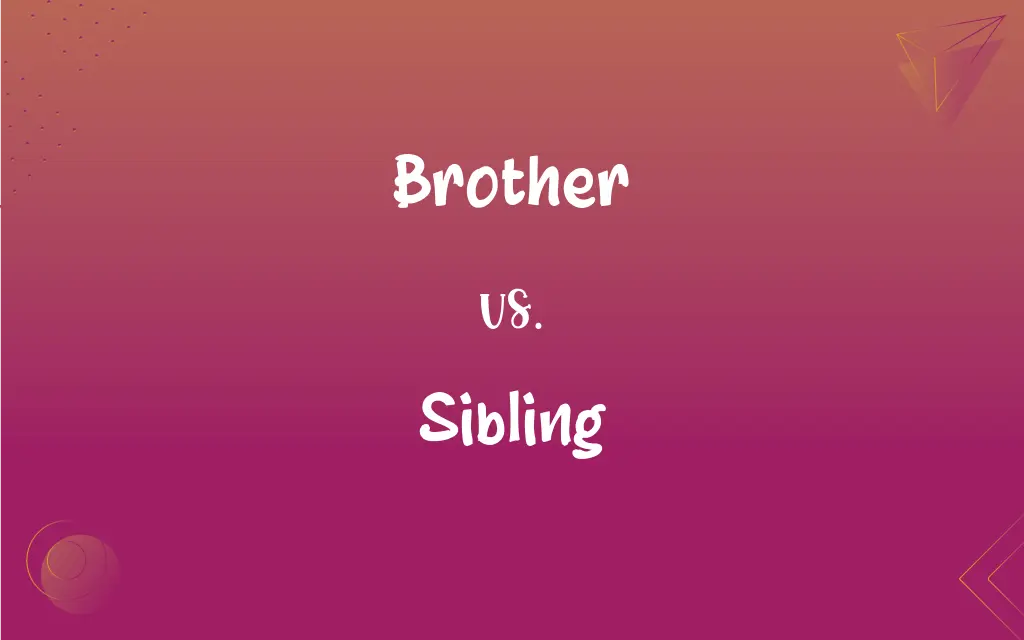Brother vs. Sibling: What's the Difference?
Edited by Harlon Moss || By Janet White || Published on January 13, 2024
A "brother" is a male sibling, while a "sibling" is a gender-neutral term referring to any brother or sister.

Key Differences
A brother is specifically a male family member who shares one or both parents with another person. In contrast, a sibling can be either male or female, encompassing brothers and sisters alike.
The term sibling is inclusive and gender-neutral, used to refer to any member of the family born to the same parents. The term brother, however, is exclusive to male members of the family.
When discussing family relations, 'brother' specifically identifies the gender of the sibling, whereas 'sibling' is used when the gender is either unknown, irrelevant, or inclusive of both genders.
In many cultures, the role and perception of a brother might differ from that of a sibling in general. 'Brother' often carries specific cultural and social expectations, while 'sibling' is a more neutral term.
The dynamics of a relationship with a brother can be different from those with a sibling. This difference stems from the gender-specific role that brothers might play in a family or society.
ADVERTISEMENT
Comparison Chart
Gender
Male
Gender-neutral (can be male or female)
Specificity
Refers specifically to male siblings
Refers to any brothers and sisters
Cultural Connotations
Often associated with specific male roles in a family
Gender-neutral, no specific cultural connotations
Use in Language
Used when referring to a male family member
Used when gender is not specified or is inclusive
Relational Dynamics
Can have specific expectations based on being male
More general family dynamics, not gender-specific
ADVERTISEMENT
Brother and Sibling Definitions
Brother
In religious contexts, a brother is a male member of the order.
Brother John led the prayer service.
Sibling
Siblings share the same parents.
Despite their differences, the siblings always support each other.
Brother
A brother can refer to a fellow member of an organization or group.
He greeted his fraternity brothers warmly.
Sibling
Sibling is a gender-neutral term for brothers and sisters.
My sibling is coming to visit next week.
Brother
A brother can also signify a male supporter or ally.
We must stand together as brothers in this cause.
Sibling
A sibling is a person's brother or sister.
She has three siblings: two sisters and a brother.
Brother
A brother is a male sibling.
My brother and I went to the same school.
Sibling
A sibling is biologically related through shared parentage.
They discovered they were long-lost siblings.
Brother
Colloquially, a brother can mean a close male friend or companion.
He's been my brother since we were kids.
Sibling
Sibling inclusively refers to both brothers and sisters.
The siblings shared childhood memories.
Brother
A male having the same parents as another or one parent in common with another.
Sibling
One of two or more individuals having one or both parents in common; a brother or sister.
Brother
A kinsman.
Sibling
A person who shares a parent; one's brother or sister who one shares a parent with.
None of my siblings are married yet.
Sibling
(comptheory) A node in a data structure that shares its parent with another node.
Sibling
(taxonomy) The most closely related species, or one of several most closely related species when none can be determined to be more closely related.
Sibling
A brother or a sister.
Sibling
A person's brother or sister
FAQs
What is a sibling?
A sibling is a gender-neutral term for a brother or sister.
What defines a brother?
A brother is a male sibling.
Is a brother always male?
Yes, a brother is specifically male.
Can a sibling be of any gender?
Yes, siblings can be male or female.
Can the term sibling include half-brothers and half-sisters?
Yes, it includes all brothers and sisters, full or half.
Is sibling a modern term?
It's been used for a long time but is more prevalent in modern inclusive language.
Does brother refer to biological relationships only?
Primarily, but it can also refer to close male bonds in other contexts.
Can brother be used in religious contexts?
Yes, in many religious orders, male members are called brothers.
Is sibling used in legal documents?
Yes, it's a common term in legal and formal contexts.
Do siblings always share both parents?
Not necessarily; they can share one parent (half-siblings) or be adopted.
Do brothers have legal responsibilities towards each other?
This varies by jurisdiction and situation.
Are all siblings related by blood?
Usually, though it can also refer to adopted or step-siblings.
Can brother imply a close friendship?
Yes, it can colloquially mean a close male friend.
Can brother be used figuratively?
Yes, to denote camaraderie or solidarity among men.
Do siblings always grow up together?
Not necessarily; they can be separated by various circumstances.
Can the term brother be used in non-familial organizations?
Yes, like in fraternities or certain social groups.
Are there cultural variations in the role of a brother?
Yes, different cultures have different expectations for brothers.
Is the term sibling emotionally neutral?
It's more neutral compared to the more specific and sometimes culturally loaded term brother.
Can the number of siblings someone has vary widely?
Yes, from none to many, depending on the family.
Can siblings have a significant impact on each other's lives?
Absolutely, siblings often play important roles in each other's development and experiences.
About Author
Written by
Janet WhiteJanet White has been an esteemed writer and blogger for Difference Wiki. Holding a Master's degree in Science and Medical Journalism from the prestigious Boston University, she has consistently demonstrated her expertise and passion for her field. When she's not immersed in her work, Janet relishes her time exercising, delving into a good book, and cherishing moments with friends and family.
Edited by
Harlon MossHarlon is a seasoned quality moderator and accomplished content writer for Difference Wiki. An alumnus of the prestigious University of California, he earned his degree in Computer Science. Leveraging his academic background, Harlon brings a meticulous and informed perspective to his work, ensuring content accuracy and excellence.






































































